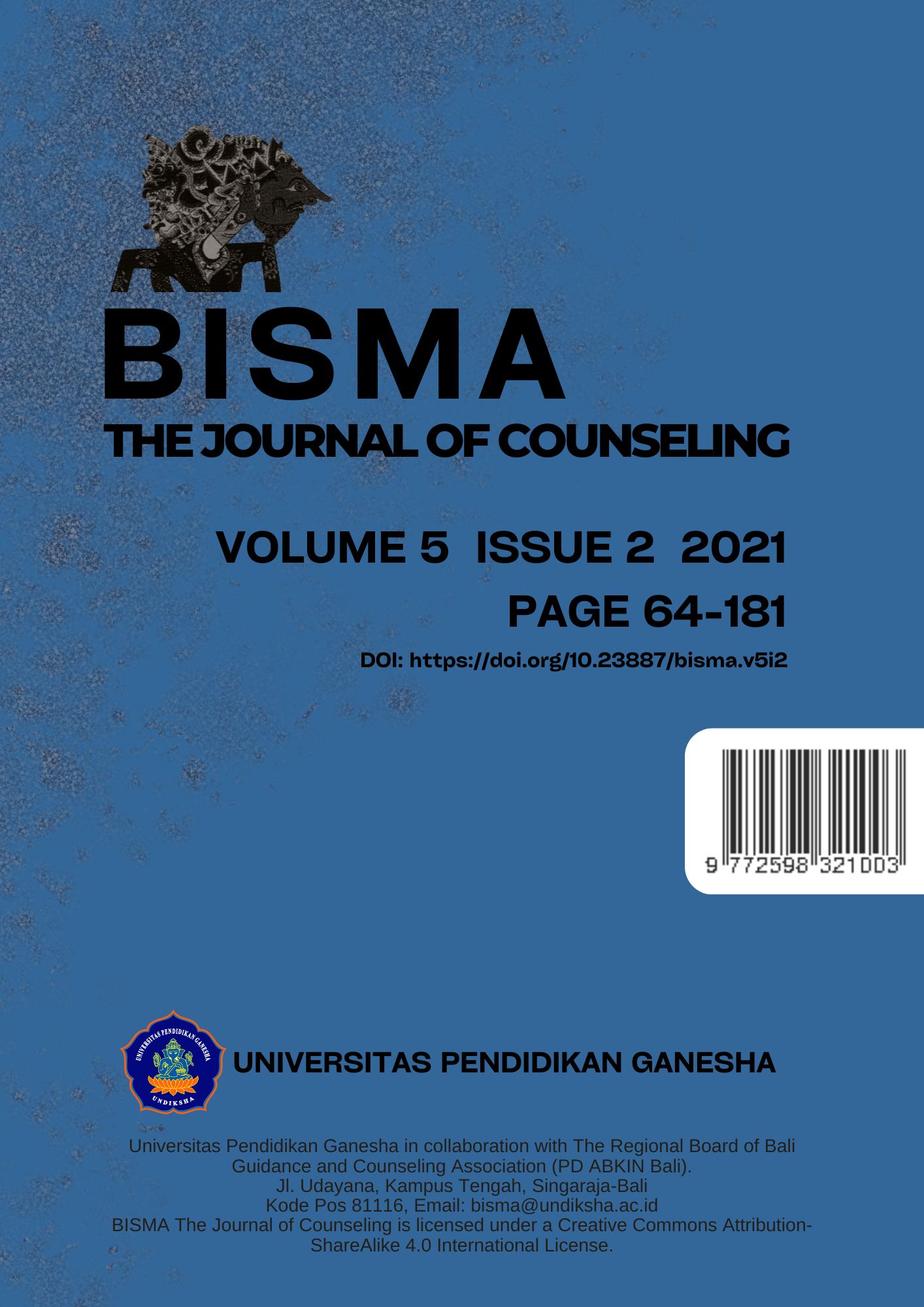The Correlation of Coping Stress and Social Support with Academic Stress on Distance Learning
DOI:
https://doi.org/10.23887/bisma.v5i2.37631Keywords:
Coping Stress, Social Support, Academic StressAbstract
This study discusses the correlation between coping stress and social support with academic stress in distance learning for 10th grade students of SMA Negeri in the District of Ngaliyan Semarang. The purpose of this study is to determine the relationship between variables and obtain information on the level of each variable with a sample of 255 students. The method in this research is ex-post facto quantitative. The results of the descriptive analysis showed that the level of stress coping of the tenth graders of SMA Negeri in Ngaliyan Semarang District was in the low category (M=2.56), the level of social support was high (M=3.04), and the level of academic stress in distance learning was high (M=2,67). The results of multiple regression analysis show that there is a negative and significant relationship between coping stress and academic stress in distance learning students (t=-10,854, =-0.646, p=<0.05), social support has no significant correlation. significant with academic stress on distance learning students (t=-0.908, =-0.054, p=>0.05), and there is a positive and significant correlation between stress coping and social support simultaneously on academic stress in distance learning students (R= 0.681; R²= 0.464; F=109.083, p=<0.05). Based on the results of the research, , it is hoped that the guidance and counseling teachers can provide guidance and counseling services to be able to reduce students' academic stress levels both individually and in groups, increase students' stress coping levels and services to maintain students' social support levels.
References
As Sururi & Muslikah. (2020). Hubungan Dukungan Sosial Teman Sebaya Dan Aktualisasi Diri Dengan Harga Diri Remaja Panti Asuhan Di Purbalingga. Jurnal Empati Bimbingan dan Konseling. 7 (1), 36-42.
Basilaia, G., & Kvavadze, D. (2020). Transition to Online Education in Schools during a SARS-CoV-2 Coronavirus (COVID-19) Pandemic in Georgia.
Desmita. (2010). Psikologi Perkembangan Peserta Didik. Bandung: Remaja Rosdakarya.
Gunawan, G., Suranti, N. M. Y., & Fathoroni, F. (2020). Variations of Models and Learning Platforms for Prospective Teachers During the COVID-19 Pandemic Period. Indonesian Journal of Teacher Education, 1(2), 61-70.
Hasan, A. B. (2012). Disiplin Beribadah: Alat Penenang Ketika Dukungan Sosial Tidak Membantu Stres Akademik. Jurnal Al-Azhar Indonesia Seri Humaniora.
Hasan, N., & Rufaidah, E. R. (2013). Hubungan antara dukungan sosial dengan strategi coping pada penderita stroke RSUD Dr. Moewardi Surakarta. TALENTA, 2(1), 41-62.
Inayatillah, V. 2015. Hubungan antara adversity question dengan kecenderungan stres dalam menyelesaikan tugas akhir (skripsi) pada mahasiswa (Doctoral dissertation, STIKES’Aisyiyah Yogyakarta).
Kadapatti, M., & Vijayalaxmi, A. (2012). Stressor of academic stress- a study on Pre-university students. Indian J.Sci.Res., 1(3), 171–175.
Naviska, Nadia. (2012). Gambaran Mekanisme Koping Siswa Kelas 3 SMA di SMAN 1 Purwakarta Tahun Ajaran 2011/2012 Menjelang ujian Nasional. Skripsi, Universitas Indonesia.
Ningrum, D. W. (2011). Hubungan optimisme dan coping stress pada mahasiswa UEU yang sedang menyusun skripsi. Jurnal Psikologi. 9(1), 41-47.
Nurfitriana. (2014). Strategi Coping Stress Siswa terhadap Tugas Seolah di SMK Farmasi Yamasi Makassar. Skripsi, Universitas Hasanuddin.
Prayascitta, P. (2010). Hubungan antara coping stress dan dukungan sosial dengan motivasi belajar remaja yang orangtuanya bercerai. Skripsi, Universitas Sebelas Maret Surakarta.
Rahmawati, D. D. 2012. PengaruhSel-Efficacy terhadap Stres Akademik pada Siswa Kelas 1 Rintisan Sekolah Bertaraf Internasional (RSBI) di SMP Negeri 1 Medan.
Rizky, E., Zulharman., & Risma, D. (2014). Hubungan efikasi diri dengan coping stress pada mahasiswa angkatan 2012 Fakultas Kedokteran Universitas Riau. JOM FK. 1(2), 1-8.
Sakti, E. D. D. (2015). Hubungan antara dukungan sosial dengan coping stress pada siswa akselerasi. Naskah Publikasi. Falkutas Psikologi, Universitas Muhammadiyah Surakarta.
Sarafino, E. P., & Smith, T. W. (2012). Health psychology: biopsychosocial interactions, 7th/ed. John Wiley & Sons, Inc.
Sugiyono. (2012). Metode Penelitian Kuantitatif, Kualitatif dan R&G. Bandung: Alfabeta
Yudiati, E. A., & Rahayu, E. (2017). Coping stress dan kecemasan pada orang-orang pengidap hiv/aids yang menjalani tes darah dan VCT (Voluntary Counseling Testing). Semarang: Prosiding Temu Ilmiah X Ikatan Psikologi Perkembangan Indonesia.
Zhu, X., & Liu, J. (2020). Education in and After Covid-19 : Immediate Responses and LongTerm Visions.









